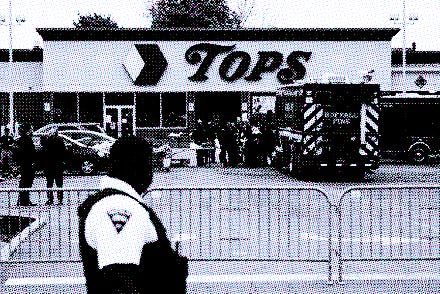Mass shootings in New York and California leave communities reeling
A gunman specifically targeted Black shoppers in upstate New York in what the police commissioner called “an absolute racist hate crime.”

News of mass shootings in the United States is unfortunately quite common, to the point that many people are almost desensitized to it. But with two shootings in two days this weekend, the news is a lot harder to ignore. And with the shootings in both Buffalo, New York, and Laguna Woods, California, people are once again expressing concerns about white nationalism’s role.
On Saturday, an 18-year-old was detained after going live on Twitch, killing 10 people, and injuring three others at a supermarket in Buffalo, New York. Of the 13 people shot, eleven were Black. In addition, they were almost all elderly, with the exceptions of 32-year-old Roberta Drury, who was killed, and 20-year-old Zaire Goodman, who has been released from the hospital.
The motivation behind the Buffalo shooting is clear: In a 180-page manifesto uploaded online, the shooter drew from antisemitic tropes like the “great replacement” theory and outlined his goal to kill as many Black people as possible. The shooter also specifically mentioned taking inspiration from the 2019 Christchurch, New Zealand, shooting, where the deaths of 51 Muslims were similarly live-streamed.
“The evidence we have uncovered so far makes no mistake,” Buffalo Police Commissioner Joseph Gramaglia said, per NPR. “This is an absolute racist hate crime that will be prosecuted as a hate crime. This is someone who has hate in their heart, soul, and mind.”
Per CNN, the shooting take place at a Tops Friendly Market located within Buffalo’s Black community. The alleged shooter is from Conklin, New York, which is about a three-and-a-half hour drive from Buffalo. The New Yorker reported the shooter chose this location by searching via zip code for the largest Black population to where he lived.
Following the Buffalo shooting, President Biden announced that he and the first lady would visit the city on Tuesday. He also tweeted, “We must work together to address the hate that remains a stain on the soul of this nation.”
But just as the nation was beginning to process the events in Buffalo, news of another shooting struck on Sunday. This time, it took place at a predominately Taiwanese church in Southern California, in the city of Laguna Woods. One person was killed and five were wounded before the churchgoers subdued and hogtied the shooter themselves. Per the Associated Press, the alleged shooter is an Asian man in his 60s.
There have been nearly 200 mass shootings in the U.S. in 2022 alone. But it’s not only the shootings by themselves that are concerning. It’s the fact that more and more are carried out by people who explicitly invoke white nationalism. In addition, these shooters are inspiring each other, as evidenced by the Buffalo shooting. While he pointed to the Christchurch shooter as inspiration, that shooter referenced the 2017 massacre in Quebec City, Canada. Similar overtly racist motivations factored into deadly shootings in Charleston, South Carolina, in 2015 and El Paso, Texas, in 2019. Last week, a gunman in Dallas injured three people at a hair salon in that city’s Koreatown in an incident officials are now investigating as a possible hate crime.
With white nationalism being named, there are increased calls to refer to these shootings as domestic terrorism. These pushes, however, only obscure the problem. Rather than seeing acts like the Buffalo massacre as connected to long histories of racialized violence in the U.S., they become individualized. Dissemination of white nationalism on social media platforms, through memes and livestreams of shootings, becomes a problem of fringe communities. Everything becomes disconnected — but in reality, racialized violence en masse is perhaps the one constant in U.S. history.